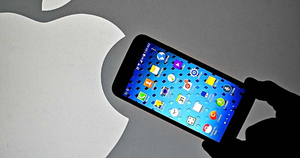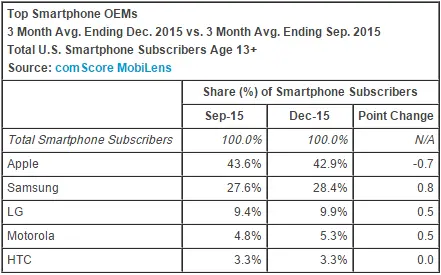
Apple’s dominance as the top smartphone maker in the U.S. continued throughout the previous year, growing slightly from 41.6 percent in December 2014 to 42.9 percent of the pie at the end of 2015. Samsung meanwhile slipped a bit, from 29.7 percent in December 2014 to 28.4 percent in December 2015. Rounding out the top five were LG (up), Motorola (flat), and HTC (down).
In the mobile OS wars, Google’s Android kept the U.S. crown with 53.3 percent, moving up 0.2 percentage points year over year, while Apple held second with iOS, also moving up the same 1.3 percentage points as a smartphone maker. Microsoft’s Windows Phone dropped 0.5 points to 2.9 while BlackBerry OS halved its share from 1.8 percent to 0.9 percent.
The latest data comes from comScore, which estimates 197.4 million Americans owned smartphones (79.3 percent mobile market penetration) during Q4 2015. Here is how the top five smartphone makers fared last quarter:

Over the last three months of the year, Apple lost share while Samsung capitalized. As we already mentioned though, Apple actually fared better when looking across the whole year. Everyone else in the U.S. market is still very far behind, though LG nearly managed to hit double digits. The bigger changes will likely come when the January figures arrive, as that’s when the impact of holiday sales will become apparent.
On the software side, Google ended 2015 very strongly. In December, Android was the undisputed winner once again while Apple’s iOS held on to second without issue:

While Microsoft’s Windows Phone fails to gain traction however, it’s BlackBerry that has managed to hit a new low. BlackBerry OS fell below 1 percent, a low it hasn’t seen for decades in the U.S. Given its Android ambitions, this is hardly surprising.
At the end of 2014, the Android-iOS duopoly in the U.S. hit 94.7 percent market share. At the end of 2015, it had hit 96.2 percent. We expected that something would give, however, Windows 10 Mobile was the only real hope, and it's been plagued with delay after delay, among other issues. Right now at least, it doesn’t look like 2016 will break Apple and Google’s mobile stranglehold.